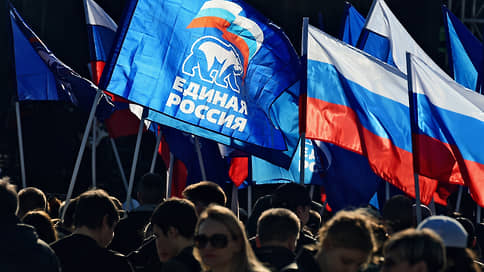Beat strangers so that they are afraid of their own
[ad_1]

More than 20 current deputies who had previously received their mandates under the banner of other parties, as well as three former self-nominated candidates, took part in the primaries of United Russia before the September elections to regional parliaments and city dumas of administrative centers, Kommersant counted. At the same time, such defectors show good results in competition with United Russia: according to preliminary data, 16 of them can count on being nominated by the ruling party. Most of these participants in the primaries came from A Just Russia – For Truth.
21 participants in the preliminary voting to determine UR candidates for regional parliaments and city councils of administrative centers previously had mandates that they received by nominating from other parties. Three more deputies previously ran as self-nominated candidates. Most of these deputies, judging by the data of the primaries, plan to run in single-mandate constituencies.
By the beginning of the primaries, only one such candidate had a EP party ticket. The rest participated in the status of non-partisans or party supporters. The leader in the number of such migrating deputies was A Just Russia – For Truth (SRZP). 12 people who previously successfully went to the polls under its banner participated in the United Russia primaries this year. The greatest losses – two deputies each – SRZP suffered in Bashkiria, Buryatia, Veliky Novgorod and Yekaterinburg. The Communist Party of the Russian Federation and the Liberal Democratic Party lost three and four deputies representing them in the elections of the current convocations, respectively. Two more deputies who took part in the United Russia primaries this year were previously nominated by the Civic Platform and Patriots of Russia.
Often deputies-“defectors” show good results in the EP primaries. So, in the Trans-Baikal Territory, the former head of the SRZP faction in the regional parliament, Vladimir Ivanchenko, took second place in the primaries in regional group No. 6 and first in single-mandate constituency No. 6. His colleague in parliament, Vadim Fomin, elected from the Liberal Democratic Party, showed a worse result: in the preliminary vote in single-mandate constituency No. 8, he was second.
In Bashkiria, two representatives of the SRZP in the regional parliament, Yuri Ignatiev and Ramazan Ramazanov, took first place in the primaries in the territories where they ran. But in Buryatia, of the two former representatives of the Socialist-Revolutionaries Bair Garmaev and Vitaly Lygdenov, only one took first place in his district – Mr. Garmaev. But in the same place, the winner in the territorial group No. 9 was self-nominated Alexander Tsydenov.
In the primaries for the selection of candidates for the Yekaterinburg City Duma, two “defectors” from the SRZP, Mikhail Vechkenzin and Alexander Kolesnikov, showed victorious results (took first places in the single-member districts where they ran). But their colleague in the city parliament from the Communist Party Andrey Pirozhkov in the UR primaries took only fourth place in constituency No. 21.
In total, according to Kommersant’s calculations, eight out of 13 deputies who had previously won elections from other parties showed victorious results in the primaries for regional parliaments. According to the primaries to the City Duma, the statistics are similar: eight “defectors” out of 16 can be considered winners in them.
Most of the winners were among the former nominees from the Social Revolutionaries – 10 people out of 14 who took part in the primaries. The right to run for United Russia also earned two former deputies nominated by the Liberal Democratic Party and the Communist Party. Of the non-parliamentary parties, one former representative of the Patriots of Russia took a passing place. 12 out of 14 winners of the EP primaries, who were deputies from other parties, intend to fight for deputy seats in single-mandate constituencies where they have already won elections.
As for the former self-nominated candidates, this time there were only three of them among the EP candidates participating in the selection. Two of them won. These are the aforementioned Alexander Tsydenov, who is running for the Buryat Khural, and Vitaly Bondarev, who is going to keep his mandate in the new convocation of the Krasnoyarsk City Duma.
Note that the victory in the primaries does not mean automatic nomination from the EP. The final word in determining their candidates remains with the party governing bodies.
“The fact that United Russia’s eyes have fallen on other parties indicates that they do not have enough of their own bench,” says political strategist Vladimir Perevozchikov. then recruiting. In this recruiting, they pay attention to trends – in this case, the SVO – and those who have shown themselves earlier in the political field. “The transition from the Socialist-Revolutionaries directly to United Russia speaks of the weakening of both the central party power and regional branches,” Mr. Perevozchikov argues. Since the deputies, experienced people, believe that they will not be elected under the flag of the SRZP … The fish is looking for where it is deeper, and the deputies – where it is better in terms of passing. Political scientist Aleksey Makarkin explains the migration of regional deputies from the SRHR by the ideological evolution that was actively unfolding by the time A Just Russia merged with For Truth! Zakhara Prilepina: “The Socialist-Revolutionaries are traditionally a party “for all that is good”: calm, moderate, socially oriented. And the party attracted the same calm politicians who marched under slogans related to health care, education … After the SVO, the evolution intensified, now it is a state-patriotic party. For some of the politicians who came there when the party was just being formed, it is very uncomfortable psychologically. The party has changed, the politicians are leaving.” The expert notes that after the death of Vladimir Zhirinovsky, some experts expected to see the LDPR as the leader in the number of defectors, but this did not happen – largely due to the fact that the party managed to maintain its ratings.
[ad_2]
Source link








